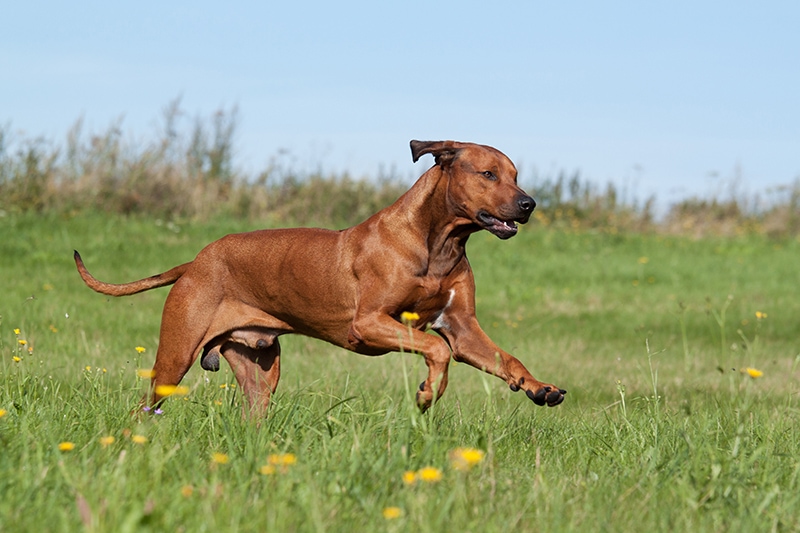How Fast Can a Rhodesian Ridgeback Run (Facts & FAQ)
By Brooke Bundy
Updated on

Quick and bold, the Rhodesian Ridgeback once bounded across the African plains in pursuit of lions, earning them the name African Lion Dog. While they didn’t necessarily kill the lions, they helped Boer farmers track them down. Since lions are the second fastest land-dwelling creature in Africa, it makes sense that the Rhodesian Ridgeback would be able to run faster than the average canine. With no conditional training, the average dog clocks in between 15 to 20 miles per hour at top speed. The Rhodesian Ridgeback soars well above average, with their top speed at 30 miles per hour. Let’s see how they compare to other animals and dog breeds.
How Fast Is the Rhodesian Ridgeback Compared to Other Dogs?
While the Rhodesian Ridgeback moves fast, several breeds have them beat. They’re actually on par with many popular breeds, such as the Poodle. The Greyhound is still the unrivaled leader of the dog pack for speed. As the fastest dog on the planet, they can run up to 45 miles per hour.
Here’s a quick visual of how fast the Rhodesian Ridgeback can travel compared to other breeds’ top speeds:
| Breed | Top Speed in MPH |
| Greyhound | 45 |
| Saluki | 42 |
| Afghan Hound | 40 |
| Vizsla | 40 |
| Rhodesian Ridgeback | 30 |
| German Shepherd | 30 |
| Labrador Retriever | 30 |
| Poodle | 30 |
| French Bulldog | 17 |
| Basset Hound | 10 |
Is the Rhodesian Ridgeback One of the Fastest Animals on Earth?
Technically, the records for the fastest creatures on Earth are based on direct observation. For example, humans typically run around 5 or 6 miles per hour. But during the 2008 Olympic Games, Jamaican runner Usain Bolt set the world record when he hit 27.5 miles per hour during a brief sprint. Scientists, however, say that the human body is capable of reaching 40 miles per hour, although it’s never been observed.
Thus, animals may be faster than we think. As far as we know, the Cheetah is the fastest land animal on Earth, more than doubling the top speed of the Rhodesian Ridgeback at 75 miles per hour. The Rhodesian Ridgeback isn’t one of the fastest animals on Earth, but they are not counted among the slowest.

Here’s how the Rhodesian Ridgeback compares to other animals, including the lions they once chased:
| Species | Top Speed in MPH |
| Cheetah | 75 |
| Lion | 50 |
| Wolf | 38 |
| Rhodesian Ridgeback | 30 |
| Human | 27 |
| Eastern Gray Squirrel | 20 |
How Much Exercise Does a Rhodesian Ridgeback Need?
Looking at these statistics, you may conclude that the robust Rhodesian Ridgeback isn’t for you. After all, you wouldn’t want them barreling through your living room faster than your car travels through parts of town. However, as long as they’re exercised frequently, these dogs will probably be content to amble around for the rest of the day.
The athletic Rhodesian Ridgeback requires at least an hour of exercise every day, although a couple of hours is ideal. At least 30 minutes of this time should include off-leash, intense exercise, such as practicing on an obstacle course at the dog park or romping around your fenced backyard. With a maximum speed of 20 miles per hour, those pesky squirrels around your bird feeder don’t stand a chance.

Conclusion
At 30 miles per hour, the Rhodesian Ridgeback is faster than many of the dogs you will encounter on your daily walk. Known by some as the African Lion Dog, Rhodesian Ridgebacks maintain their bold reputations in modern competitions where they score proficiently in tracking, agility, and obedience. Around the home, these dogs can be chill companion animals, as long as they receive at least an hour or two of exercise each day.
Featured Image Credit: Vera Zinkova, Shutterstock













